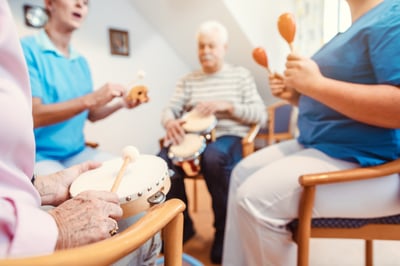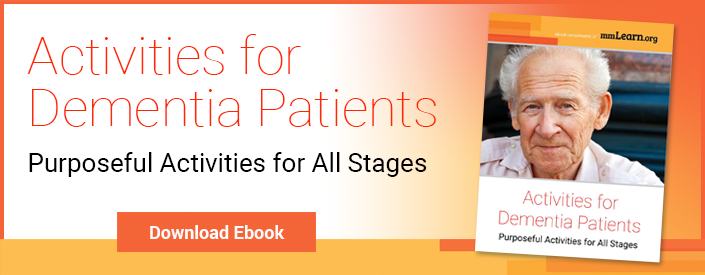 Caring for someone with dementia can be physically and emotionally taxing. Part of the challenge is helping your loved one manage the frequent confusion, frustration, and mood swings that often accompany such neurodegenerative diseases.
Caring for someone with dementia can be physically and emotionally taxing. Part of the challenge is helping your loved one manage the frequent confusion, frustration, and mood swings that often accompany such neurodegenerative diseases.
Of course, the effects of the disease can frustrate caregivers too. Loving someone with dementia requires tremendous patience and compassion. Fortunately, there are strategies and dementia‑friendly activities that help both seniors and caregivers.
As a caregiver, one of your most powerful tools is music therapy for dementia. Music therapy soothes seniors and caregivers alike. Below, you'll find information about music therapy, how it helps aging seniors, and what a typical session entails.
What Is Music Therapy?
Music therapy is a research‑backed strategy of using melodies and harmonies to increase the physical, mental, and emotional functioning of dementia patients. The sensory and intellectual stimulation of music — particularly certain music styles — can help maintain a person's quality of life, especially while suffering from cognitive decline.
In the following video, music therapist Amy Standridge, MM, MT‑BC, gives an overview of music therapy for those interested in learning new ways to encourage positive reinforcement of appropriate behaviors and reduce the negative ones. She discusses how music therapy can help you improve your loved one's quality of life.
Music therapy can help your loved one with dementia in at least three specific ways:
- Music can help evoke lost memories.
- Music can soothe and manage frustration and agitation.
- Music can encourage social bonding after dementia has created distance and disconnection.
How Music Can Evoke Memories
Music evokes powerful emotional responses in the listener. It can even transport our minds to other places, triggering vivid memories of years gone by. Songs from childhood can usher in happy memories of people who might no longer be with us.
If your favorite childhood tunes make you feel warm and safe, you can imagine how music affects seniors with dementia. It can help them conjure vital memories that may otherwise evade them.
The sounds and rhythms of music also interact with the motor center of the brain. This section of the brain remains intact even in late‑stage dementia. As a result, even patients who can no longer participate or communicate can still absorb and process music.
Caregiver Tip: Make a Playlist
When using music to conjure memories and feelings, it's helpful to choose songs that your loved one knew earlier in life. If you know their favorite songs, you can customize a playlist to suit their tastes. If you're uncertain of their music tastes, pick a musical hit from each decade, ones they would have heard on the radio countless times.
How Music Can Help Dementia Patients Deal with Frustration
Those with dementia often experience greater stress and confusion. As memories fade, so too do social and emotional connections. All of this can be frightening.
Music can help calm your loved one. Music helps them process stress more easily.
Studies show that music has a profound emotional influence on the listener. By playing relaxing and rhythmically focused tunes, such as classical music, you can ease anxiety and frustration. By singing and dancing, you can physically engage the person in the music, which will help to redirect their attention from their frustrations or worries.
Caregiver Tip: Schedule Music Moments in Advance
Take note of specific times of day or activities that cause your loved one anxiety or stress. By preparing for these moments in advance, you can ensure music is playing at critical times.
How Music Can Encourage Bonding
In the late stages of dementia, your loved one might withdraw from you and other family members. That's because they can no longer express love and affection as effectively as before.
Music can help fill the gap when methods of affection have been lost. Through music, you can encourage loved ones to tap into their emotions. You can ease into hugging or dancing. At the very least, you can enjoy a moment of contentment and relaxation together.
Caregiver Tip: Actively Participate in the Music
Engage your loved one on a deeper level by singing and dancing to their favorite songs. Sometimes music and dance will encourage emotional expressions that seemed shut off. Dancing can lead to physical affection, such as hugging and handholding (even kissing, when appropriate).
What Does a Music Therapy Session Look Like?
Music is one of the most powerful, accessible ways to connect with a loved one suffering from cognitive decline. This new way of breaking through and touching older adults with music is rapidly growing in popularity and acceptance.
But what does music therapy look like?
In the following video, watch Amy Standridge, MM, MT‑BC, conduct a music therapy group session. Amy has been a board‑certified music therapist since the year 2000. She loves what she does and wants to share the benefits of music therapy with others by showing you what an actual session might look like.

